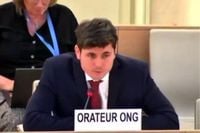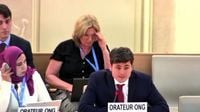On March 27, 2025, journalist Vito Quiles made a powerful statement before the United Nations in Geneva, drawing attention to the alarming state of press freedom in Spain under the government of Pedro Sánchez. Supported by the organization Hazte Oír, Quiles condemned what he described as a systematic campaign of censorship and political persecution against journalists who dare to question the government.
During his address, Quiles highlighted the structural corruption surrounding Sánchez and his administration, asserting that journalists in Spain who tackle uncomfortable questions or investigate corruption face relentless harassment. He pointed out that many media professionals are forced to self-censor due to the threat of retaliation, which he argued is a clear sign of growing authoritarianism.
Quiles’s remarks were not merely a reflection of personal grievances; they echoed a broader crisis affecting the media landscape in Spain. He stated, "Spain is no longer a democracy," and labeled Sánchez a "tyrant without scruples," accusing the government of stifling freedom of thought and silencing dissenting voices. His comments resonated with the audience, sparking discussions about the implications for democracy in the country.
In his speech, Quiles emphasized the urgent need for the UN to hold the Spanish government accountable, urging them to demand protections for journalists against aggression and reprisals. He insisted that the right to free and independent journalism is essential for a functioning democracy. "Without a free press, without free judges, and without civil society, there is no freedom," he declared, underscoring the critical role of media in ensuring accountability.
Quiles's intervention was part of a larger campaign initiated by Hazte Oír, which aims to support journalists facing oppression and to raise awareness about the threats to free expression in Spain. The organization, accredited as a consultative entity to the UN, has gathered nearly 70,000 signatures from citizens concerned about the authoritarian drift of the Sánchez government.
Hazte Oír's spokesperson, Javier Villamor, expressed that this action in Geneva marks the beginning of a series of initiatives designed to spotlight the ongoing threats to freedom of expression in Spain. The organization plans to continue its efforts both nationally and internationally, striving to protect journalists and uphold democratic values.
Quiles's outspoken criticism of the Sánchez administration has made him a controversial figure in Spanish politics. He has been linked to far-right movements and has faced backlash for spreading misinformation, yet he maintains a significant following among those who share his concerns about government overreach. His appearance at the UN has further ignited debates on social media, with many rallying behind his call for press freedom.
During his address, Quiles also referenced specific judicial cases implicating members of Sánchez's inner circle, emphasizing the need for transparency and accountability. He lamented the climate of fear that has enveloped journalists in Spain, noting that those who dare to challenge the status quo are often subjected to a campaign of harassment and intimidation.
As the situation in Spain continues to evolve, Quiles’s denunciation at the UN serves as a critical reminder of the fragile state of press freedom and the importance of safeguarding democratic principles. The growing polarization within Spanish society, fueled by the lack of transparency from the Sánchez government, further complicates the landscape for journalists striving to report the truth.
Quiles’s call to action resonates not only within Spain but also globally, as the international community grapples with similar challenges to press freedom and democratic governance. His passionate appeal for the protection of journalists highlights the universal struggle for truth and accountability in an era marked by misinformation and political strife.
In conclusion, Vito Quiles's bold statements at the UN have brought much-needed attention to the pressing issues of censorship and corruption in Spain. His advocacy for press freedom reflects a broader movement to ensure that journalists can operate without fear of reprisal, a fundamental right that is essential for the health of any democracy. As Hazte Oír and other organizations rally to support this cause, the call for a free and independent press remains more relevant than ever.






